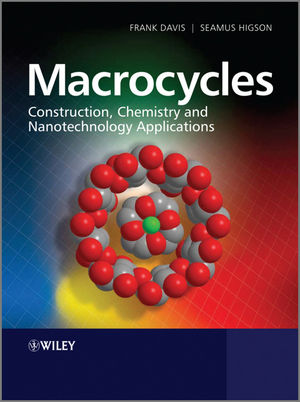Macrocycles: Construction, Chemistry and Nanotechnology ApplicationsISBN: 978-0-470-71463-8
Paperback
608 pages
April 2011
 This is a Print-on-Demand title. It will be printed specifically to fill your order. Please allow an additional 10-15 days delivery time. The book is not returnable.
Other Available Formats: Hardcover
|
||||||
1. Introduction.
1.1. Simple ring compounds.
1.2. Three dimensional aliphatic carbon structures.
1.3. Annulenes.
1.4. Multi-ring aromatic structures.
1.5. Porpyrins and phthalocanines.
1.6. Conclusions.
References.
2. Cyclophanes.
2.1. Introduction to cyclophanes.
2.2. Cyclophanes with one aromatic system and aliphatic
chain.
2.3. Cyclophanes with more than 1 aromatic ring.
2.4. Napthalenophanes and other aromatic systems.
2.5. Cyclophanes containing heteroaromatic systems.
2.6. Ferrocenophanes.
References.
3. Crown ethers, cryptands and other compounds.
3.1. Introduction.
3.2. Crown ethers.
3.3. Simple complexes with crown ethers.
3.4. Azacrowns, cyclens and cyclams.
3.5. Crowns containing other heteroatoms.
3.6. Lariat and bibracchial crown ethers.
3.7. Cryptands.
3.8. Spherands.
3.9. Combined and multiple systems.
3.10. Applications of crown ethers and related compounds.
3.11. Conclusions.
References.
4. Calixarenes.
4.1. Introduction to calixarenes.
4.2. History of the calixarenes.
4.3. Structures of calixarenes.
4.4. Chemical modification of calixarenes.
4.5. Complexes with calixarenes.
4.6. Bis- and multicalixarenes.
4.7. Oxacalixarenes, azacalixarenes and thiacalixarenes.
4.8. Resorcinarenes - synthesis and structure.
4.9. Cavitands and carcerands.
4.10. Uses of calixarenes and conclusions.
References.
5. Heterocalixarenes and calixnaphthalenes.
5.1. Introduction to heterocalixarenes and
calixnaphthalenes.
5.2. Calixnaphthalenes.
5.3. Tropolone based macrocycles.
5.4. Calixfurans.
5.5. Calixpyrroles.
5.6. Calixindoles, calixpyridines and calixthiophenes.
5.7. Conclusions.
References.
6. Cyclodextrins.
6.1. Introduction to cyclodextrins.
6.2. Complex formation by cyclodextrins.
6.3. Cyclodextrins of other sizes.
6.4. Modification reactions of cyclodextrins.
6.5. Selectivity of cyclodextrins.
6.6. Multiple cyclodextrin systems.
6.7. Polymeric cyclodextrins.
6.8. Cyclodextrins combined with other macrocyclic systems.
6.9. Therapeutic uses of cyclodextrins.
6.10. Other uses of cyclodextrins.
6.11. Conclusions.
References.
7. Cyclotriveratylenes and cryptophanes.
7.1. Introduction to cyclotriveratrylenes and
cryptophanes.
7.2. Synthesis of cyclotriveratrylenes.
7.3. Modification of cyclotriveratrylenes.
7.4. Synthesis of optically active cyclotriveratrylenes.
7.5. Modification of the bridging groups.
7.6. Modification of the aromatic rings with organometallic
groups.
7.7. Selective binding applications of cyclotriveratrylenes.
7.8. Analogues of CTV.
7.9. Cryptophanes - synthesis and structure.
7.10. Cryptophanes - chemical modification.
7.11. Complexes with cryptophanes.
7.12. Cryptophane/Xenon complexes.
7.13. Other uses of cryptophanes.
7.14. Hemicryptophanes.
7.15. Conclusions.
References.
8. Cucurbiturils.
8.1. Introduction to cucurbiturils.
8.2. Complexation behaviour of simple cucurbiturils.
8.3. Modification of cucurbiturils.
8.4. Uses of cucurbiturils.
8.5. Hemicucurbiturils.
8.6. Conclusions.
References.
9. Rotaxanes and catenanes.
9.1. Introduction to rotaxanes and catenanes.
9.2. Rotaxanes.
9.3. Rotaxanes as molecular machines.
9.4. Thin films of rotaxanes.
9.5. Polyrotaxanes.
9.6. Catenanes.
9.7. Switchable catenanes.
9.8. Catenanes on surfaces.
9.9. Polycatenanes and catenated polymers.
9.10. Natural catenanes.
9.11. Conclusions.
References.
10. Other supermolecular systems, molecular motors, machines
and nanotechnological applications.
10.1. Introduction.
10.2. Other molecular systems.
10.3. Molecular devices, motors and machines.
10.4. Conclusions.
References.



